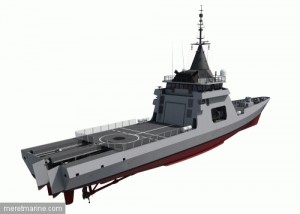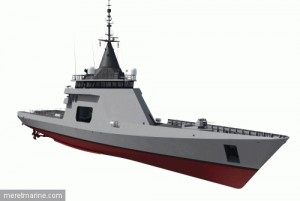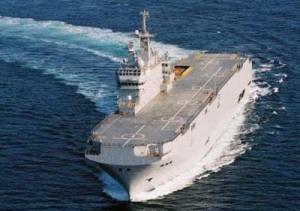Le premier patrouilleur du type Gowind est sorti ce week-end de son hall de construction situé sur le site DCNS de Lorient, où le navire doit être mis à flot mercredi prochain. Réalisé sur fonds propres par DCNS dans le cadre du programme Hermès, cet offshore patrol vessel (OPV) sera remis à la Marine nationale en fin d’année. Au travers d’une convention de partenariat, la flotte française utilisera ce patrouilleur pour ses besoins opérationnels durant trois ans. Baptisé L’Adroit, le navire, qui sera basé à Toulon, sera placé sous le commandement organique du commandant de la force d’action navale (FAN). Un premier noyau d’équipage sera constitué à compter du 1er juin.
Un peu plus d’un an après la découpe de la première tôle (7 mai 2010), la coque du premier OPV du type Gowind est donc terminée. Il reste, désormais, à achever la superstructure et mettre en place la mâture. Et, d’ici l’été, le bâtiment devrait faire sa première sortie en mer.
Long de 87 mètres pour un déplacement d’environ 1500 tonnes en charge, L’Adroit disposera d’une artillerie légère, ainsi que d’un système de mise à l’eau d’embarcations rapides par le tableau arrière. Il pourra également embarquer un hélicoptère ou des drones.
Archive | mai 16th, 2011
DCNS prépare la mise à flot du premier patrouilleur de type Gowind
Posted on 16 mai 2011.
Posted in OPV0 commentaire
Sticking point of Mistral talks is hi-tech transfer
Posted on 16 mai 2011.
Most problematic issue in Russian-French negotiations on procurement of Mistral class assault landing ships is transfer of hi-tech systems, reports World Arms Trade Analytic Center (WATAC).
According to WATAC, the issue of the ships’ configuration should have been settled in the first instance.
Equipment of Mistral class ships includes three-dimensional radar, satellite communication sets Syracuse III, Inmarsat, and FLEETSATCOM, automated tactical control system Zenith-9, and battle information/command system SIC-21.
As was reported by RIA Novosti referring to a source in Russian defense industry, « Russian party would sign a Mistral procurement contract only in case if France agrees to deliver Zenith-9 tactical control system along with production license ».
According to the source, « Russians stick out for acquirement of this system, so France’s consent to transfer Zenith-9 would determine the contract’s fate », points out RIA Novosti.
There are some discords on other systems as well, although they are not of fundamental nature.
Obstinacy of French party at negotiations is because France returns to all NATO’s military structures and is unindifferent to what other Alliance members say about technology transfer to Russia.
France will insist on the ship’s construction under civil standards with minimal transfer of defense technologies; that is just what happens now, reports WATAC.
At the same time, Russia is primarily interested in transfer of military technologies, both in shipbuilding and equipment. As is known, hardware configuration is just what determines further use of the ship.
Mistral class ships can be used as amphibious transport docks, floating hospitals, or evacuation vessels for humanitarian missions. Onboard control center equipped with advanced communication facilities makes Mistral an ideal command ship which is important for Russia in its long-range operations.
12.05.2011
Posted in BPC0 commentaire
Mistral:la Russie change de négociateurs
Posted on 16 mai 2011.
AFP 13/05/2011 | Mise à jour : 17:11
Le vice-premier ministre russe, Sergueï Ivanov, a annoncé vendredi que Moscou avait changé l’équipe de négociateurs russes chargés de l’achat de deux navires de guerre français de type Mistral, sur fond de pourparlers difficiles.
« De notre côté, la délégation chargée des négociations est dirigée par Rosoboronexport », l’entreprise publique russe chargée des exportations d’armements, a déclaré M. Ivanov à des journalistes qui l’interrogeaient sur le changement d’équipe, selon l’agence Interfax.
Une source militaire russe avait indiqué la semaine dernière que l’équipe de négociateurs russes avait changé après le limogeage de l’adjoint au commandant de la Marine, le vice-amiral Nikolaï Borissov, et la nomination du vice-ministre de la Défense, Vladimir Popovkine, à la tête de l’Agence spatiale russe.
Les négociations achoppent sur les transferts de technologie, avant tout le système de combat Zenith 9 et le système de commandement SIC-21, selon une source militaro-diplomatique citée par l’agence Interfax.
Ces difficultés pourraient repousser à l’année prochaine la signature du contrat évalué par Moscou à au moins 1,5 milliard d’euros, qui a fait l’objet d’un accord politique entre les deux pays, selon la même source.
La Russie achètera deux Mistral à condition que la France accepte de transférer les technologies du Zenith 9, a averti au début du mois une source du complexe militaro-industriel russe.
Fin janvier, la France et la Russie ont signé à Saint-Nazaire (ouest de la France) un accord très controversé qui prévoit la fabrication de quatre navires de type Mistral pour la marine russe. Deux bâtiments doivent être construits essentiellement en France et deux en Russie.
La fourniture à Moscou d’un tel navire est une première pour un pays de l’Alliance atlantique. Elle a suscité les critiques de Washington et des pays baltes, membres de l’Otan comme la France, ainsi que de la Géorgie.
Posted in BPC, Inclassable0 commentaire
Mistral Ship Agreement Is Losing Steam
Posted on 16 mai 2011.
Apart from the ongoing battle between Russia’s top brass and defense industry, the top military story has been the developing crisis over the planned purchase of two Mistral helicopter carriers from France.
It turns out that both sides have a different understanding of which technologies should be included in the deal and of the overall price tag. Russia insists that the Mistral ships come equipped with all of the advanced control systems for which they wanted the ships in the first place. Contrary to popular belief, the Navy is primarily interested in the Mistral’s capabilities as a command center and not its modest forced-projection potential.
But the French military and defense industry are wary about transferring the ship’s critical SIC-21 command and control system. Moreover, Russia wants to buy the two Mistrals with all of the “extras” for 980 million euros ($1.45 billion), whereas France calculates the price for the deal at 1.15 billion euros.
These disagreements brought negotiations to a standstill in early April, and both sides are now working to restart them. Meanwhile, one senior Russian official has already become a casualty. President Dmitry Medvedev has sacked Navy Vice Admiral Nikolai Borisov, supposedly for agreeing to the 1.15 billion euro price tag without first obtaining authorization from the top.
What is the root cause of this crisis?
As usual, both sides have contributed to the problem. Russia has not yet built up experience in purchasing big-ticket foreign military equipment for import. Despite the popular notion that Russia is planning to re-equip its military with foreign weapons systems, the reality is that such imports total less than $100 million per year. By contrast, Russia exported $10 billion in arms in 2010, with another $16 billion in equipment purchased for domestic use. What’s more, the lion’s share of those so-called “imports” are actually systems and components that foreign clients wanted installed in Russian equipment for export, meaning that they were never intended for domestic use.
Without experience in foreign procurement deals, Russia also lacks the necessary legislation and history of cooperation between the relevant institutions. This has resulted in a less than perfect level of cooperation between the Russian military; Rosoboronexport, the country’s weapons export and import monopoly; and the defense industry.
In addition, there are powerful opponents to the deal on the Russian side, especially the domestic shipbuilding industry and its patron, Deputy Prime Minister Igor Sechin. In summer 2008, Sechin halted the ill-advised purchase of the dilapidated and unfinished Ukrainian cruiser Ukraine for 20 billion rubles (more than $670 million). The influence of the gray eminence has declined since then, but it remains strong enough to stop the Mistral purchase in one way or another. Political opponents to Defense Minister Anatoly Serdyukov and his reforms have also used the disagreements over the Mistral to boost their cause.
Although building up a balanced Russian fleet does require landing docks and aircraft carriers, owning a helicopter carrier is not a vital necessity. More urgent is the need for corvette and frigate class ships as well as latest generation non-nuclear submarines. Therefore, the Mistral purchase should not be a top priority.
According to one popular theory, Russia ordered the Mistral ships not so much to augment its Navy but as a gesture to thank France and President Nicolas Sarkozy for the French stance during the Russia-Georgia war in 2008. At that time, the shipyard in Saint-Nazaire had almost no clients. A possible Russian order was important for the French shipbuilding industry and for the political reputation of Sarkozy. But the situation has changed significantly since then. The economic picture at the Saint-Nazaire shipyard is not as dire as it was in 2008, and the French can now allow themselves to take a firmer position with regard to the transfer of sensitive technologies.
In addition, Russia and France are approaching new electoral cycles, and both presidents have some chance of winning re-election. Accordingly, whatever political or personal agreements they made in the past are gradually losing force.
Finally, Russia’s sudden tougher stance on the deal could be because of Moscow’s dissatisfaction over Sarkozy’s involvement in the Libyan operation in which France, the top instigator of the Libyan operation, and other Western militaries have gone far beyond the mandate of the United Nations Security Council that limited military operations to achieve two goals only: to enforce a no-fly zone over Libya and protect its civilians. In that context, Moscow’s decision to backtrack on the Mistral purchase could send a signal to Paris that the special relationship between the two countries could suffer if things get too much out of hand in the Western coalition’s campaign against Libya.
For its part, in the past several years French arms exporters have shown an unmatched ability to torpedo arms deals at the very last moment. They demonstrated this brilliantly during attempts to sell Rafale fighter jets to Morocco, Brazil and the United Arab Emirates — countries that have traditionally purchased French arms and that maintain excellent political, military and industrial ties with Paris.
In the first half of the last decade, French military exports peaked at between $6 billion and $7 billion per year, but have now fallen to below $4 billion annually. That is lower than both Russia and tiny Israel, a country that does not produce military aircraft and ships. In fact, market participants note that French arms are unusually expensive, that the French exhibit arrogance and petty greed in dealing with clients and that France does a poor job of supplying after-sales service for the equipment it sells, a problem often attributed to Russian arms exporters as well.
For all of these reasons, Russia’s largest foreign arms purchase is under threat of being annulled. Time is working against the Mistral deal, and the chances of signing a final contract are becoming increasingly elusive.
Ruslan Pukhov is director of the Center for Analysis of Strategies and Technologies and publisher of the journal Moscow Defense Brief.
Posted in BPC, Inclassable0 commentaire
- Back to PGP
- 53ème Flottes de Combat en route
- 52ème Flottes de Combat livré !
- Fin de la belle aventure bretonne…[updated : vendu le 6 janvier 2023]
- Opération Erminig
- En 2022, j’ai juste envie de faire du Splunk et de la PKI
- Le 51ème est en route …
- Quelques notes sur Log4j
- Eléments de conf pour TP TLS
- Playing with HTTPS
Stay up to date

- Subscribe to the RSS feed
- Subscribe to the feed via email



